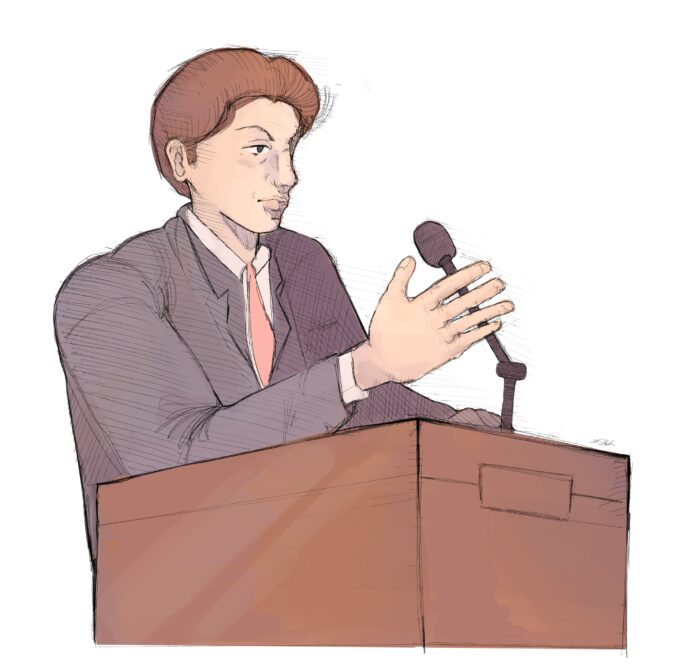Whether they be casual or competitive, based on critical thinking or creativity, student clubs at the College of William and Mary are at the center of campus life. The College’s Ethics Club blends these characteristics into a tight-knit community that loves to learn, think and debate together.
The Ethics Club forms and prepares teams that compete at regional and eventually national competitions, debating cases on ethical grounds. These competitions allow students to engage in conversations about difficult topics.
Despite their technically competitive nature, these competitions are not hinged on winning and losing. Instead, teams’ priorities are to have the strongest, most well-structured and well-presented arguments.
At the College, Ethics Club is a newcomer. It was founded in his freshman year by Bernardo Jimenez ’26, who enjoyed the club in high school.
“We came in fifth place in nationals my senior year of high school, so I’m not going to pretend I randomly found Ethics Bowl or something,” Jimenez said. “I did it in high school, and there wasn’t a team here, so I just signed up, and I actually went to the first virtual regional by myself and made it to nationals.”
Not wanting to compete at nationals alone, the following year Jimenez recruited another ethics enthusiast, Sam Roach ’25, after sharing a class together.
“We were in an ethics class together where the professor didn’t lecture, he just argued with the students,” Roach said. “He’d give a really divisive reading and then he’d beat the entire class in an argument every day, and I would always fiercely argue with him, so I guess Bernardo was like ‘Oh, this kid can argue.’”
The two quickly established a strong partnership. Both being philosophy majors, the partners have a thorough understanding of philosophical ideas and are able to build on each other’s ideas quickly in competitions.
“I’ve never had a better chemistry with someone at a certain competition than with Sam and Ethics,” Jimenez said. ”It’s almost like we function as one at this point.”
The pair made it to nationals last year — a feat made even more impressive by the fact that most teams consist of upwards of five members each and a faculty coach. However, Roach believes their unique team situation ultimately helps them out.
“We offset it by understanding the Bowl well, and the dynamics of the Bowl, and by being more conversational in a way that makes us more appealing,” Roach said.
The pair’s focus has since shifted towards growing the Ethics Club beyond their duo. The first step was getting the club established as a Recognized Student Organization at the College, which was their main priority last year.
After information sessions and tryouts, the club has gained its first three passionate new members this semester, who make up their own competitive team. New member Griffin Bennett-Nguyen ’28 was not expecting to be involved in an Ethics Club after not enjoying the intense competition of traditional high school debate.
“I had no clue what to expect when I showed up, but Sam and Bernardo did a really great job of onboarding us and showing us how everything was done in the first couple of clubs and practices,” Bennett-Nguyen said.
A philosophy major is not a requirement to participate in Ethics Club; Jimenez and Roach believe that anyone can learn the skills needed. Their new members reflect this idea.
“I’m probably going to major in math or physics, so philosophy is kind of a complete aside for me, but getting to learn about the frameworks and applications has been pretty interesting,” Bennett-Nguyen said.
Jimenez and Roach are also excited about the different challenges that come with onboarding new members. Instead of just organizing and preparing for their own cases, they are learning how to coach a new team to success.
While other schools are often mentored by a faculty member, Jimenez and Roach have tried to use their position as peers to create a dynamic learning environment for their new members. They said this process involves using mock cases, which allows for constant feedback to new members while maintaining the collaborative, friendly atmosphere that makes the College’s Ethics Club special.
This feedback is as careful and nuanced as the arguments themselves; Jimenez and Roach carefully pick out details to help new members improve. They offer encouragement and advice on how to transition between speakers during their presentations, address commentary or questions from opponents and maintain confidence and composure throughout.
Witnessing new members’ growth in confidence and public speaking skills makes Jimenez proud.
“It’s been nice to see them sort of come into their own, as they learn what we do, how to talk, how to formulate the cases and stuff like that,” Jimenez said.
Even though the environment is one of learning, Ethics Club also prioritizes a relaxed atmosphere for its members. Coaches and new members engage in discussion about cases while cracking jokes and building camaraderie.
This hard work has a focus: Building the confidence and skills of new members will allow them to apply their skills at the upcoming Mid Atlantic Regional Bowl. Because of the bowl’s structure, only one team from the College can advance to the national level, so the trio team of new members are prioritizing learning as much as they can from the experience so they know what to expect in the future.
“It’s kind of liberating, because there’s not much pressure on us. We just kind of want to go there and have some fun and see how we stack up against the competition since this is our first competition,” Bennett-Nguyen said.
Even with the competition looming, it is not too late to join Ethics Club. Send in an email at ethicsclub@wm.edu if you’re interested in joining this tight-knit, collaborative group.

